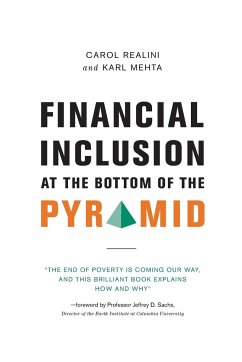
Versandkostenfrei!
Erscheint vorauss. 1. Januar 2030




Jonathan Morduch and Timothy Ogden define the fundamental components of finance and explain in straightforward language how the lack of financial inclusion reinforces broader inequities in our society. The book answers core questions: What is financial inclusion? Why does it matter? How does it work? When doesn't it work? What are the risks?
Jonathan Morduch is Professor of Public Policy and Economics at the Wagner Graduate School of Public Service at New York University. He is a founder and Executive Director of the NYU Financial Access Initiative.. He is the coauthor of The Financial Diaries: How American Families Cope in a World of Uncertainty (2017), Portfolios of the Poor: How the World's Poor Live on $2 a Day (2009),and The Economics of Microfinance (2010); and coeditor of Banking the World: Empirical Foundations of Financial Inclusion (2012). Morduch has taught on the Economics faculty at Harvard, and has held visiting positions at Stanford, Princeton, Hitotsubashi University, and the University of Tokyo. Timothy Ogden is Managing Director of the Financial Access Initiative, a research center focused on financial services for low-income households around the world, and an adjunct professor at NYU Wagner. He is a senior fellow of the Aspen Institute's Economic Opportunities Program and Financial Security Program.. He was also managing director of the US Financial Diaries project, an initiative which tracked the financial lives of 235 low- and moderate- income US household for a full year. Ogden serves as a director of Sona Partners, and chairman of GiveWell. He has developed and edited more than 20 books, and is co-author of Toyota Under Fire (2011) and author of Experimental Conversations (2016).
Produktdetails
- Verlag: Oxford University Press Inc
- Seitenzahl: 208
- Erscheinungstermin: 1. Januar 2030
- Englisch
- Abmessung: 210mm x 140mm x 3mm
- Gewicht: 3g
- ISBN-13: 9780190249960
- ISBN-10: 019024996X
- Artikelnr.: 59986724
Herstellerkennzeichnung
Libri GmbH
Europaallee 1
36244 Bad Hersfeld
gpsr@libri.de
Für dieses Produkt wurde noch keine Bewertung abgegeben. Wir würden uns sehr freuen, wenn du die erste Bewertung schreibst!
Eine Bewertung schreiben
Eine Bewertung schreiben
Andere Kunden interessierten sich für












